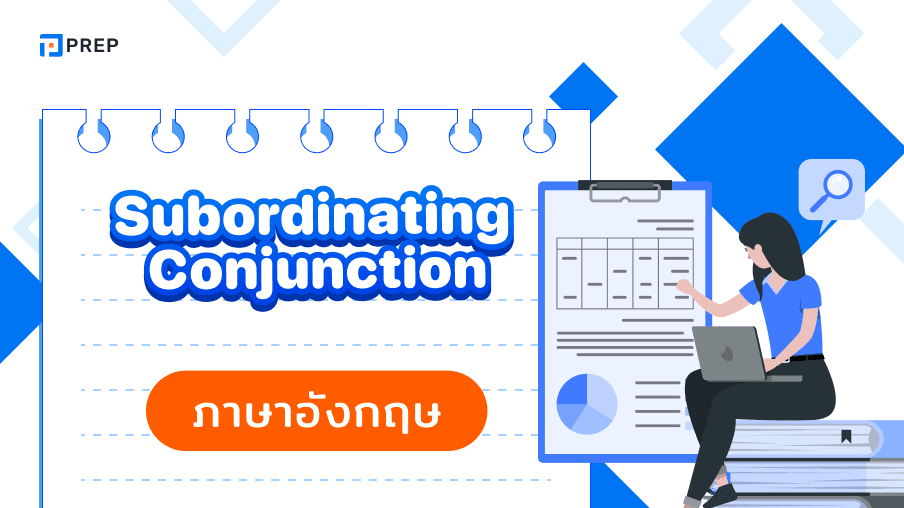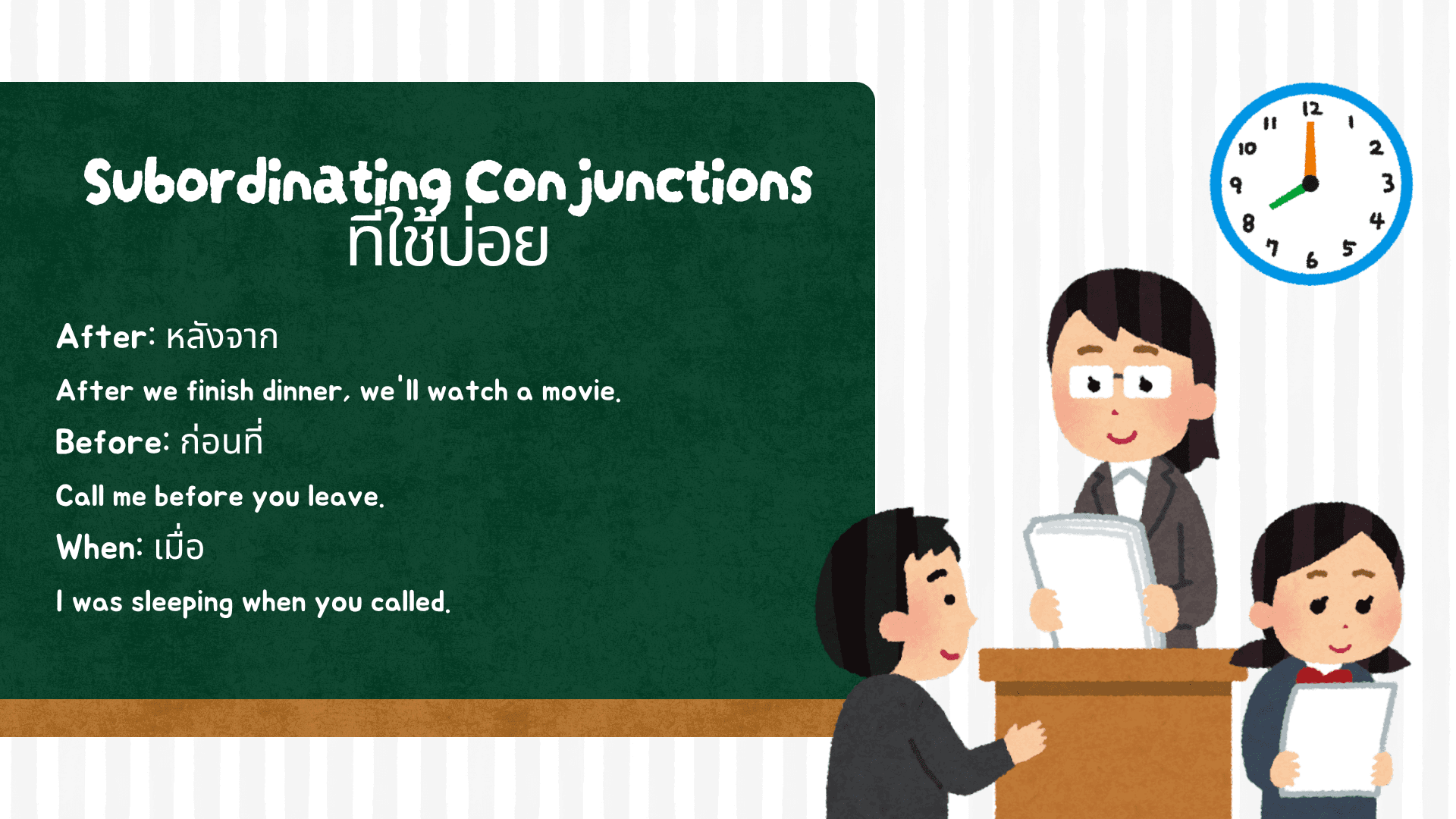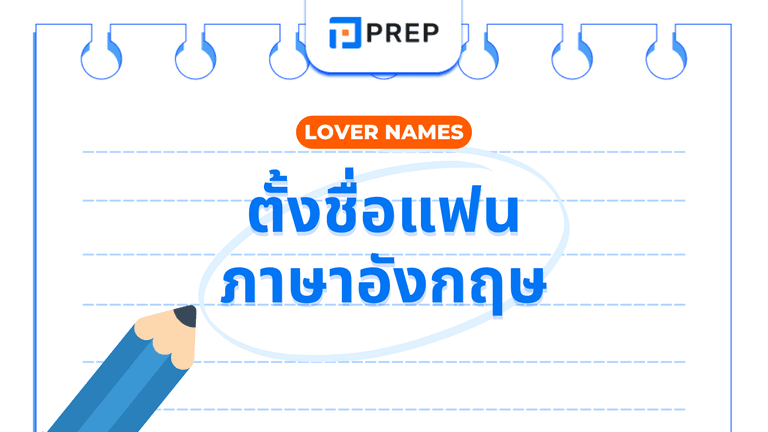Subordinating Conjunctions พร้อมตัวอย่างเข้าใจง่าย
การเขียนภาษาอังกฤษที่น่าประทับใจและมีความซับซ้อนไม่ใช่เรื่องง่าย หลายคนมักติดขัดเมื่อต้องสร้างประโยคที่มีความเชื่อมโยงและแสดงความสัมพันธ์ระหว่างแนวคิดต่างๆ อย่างชัดเจน ขาดเครื่องมือสำคัญที่จะเปลี่ยนการเขียนแบบเรียบๆ ให้กลายเป็นงานเขียนที่มีมิติและน่าสนใจ
subordinating conjunctions คือคำเชื่อมสำคัญที่ช่วยสร้างประโยคซับซ้อนและแสดงความสัมพันธ์เชิงตรรกะ เป็นเครื่องมือหลักในการยกระดับทักษะการเขียนภาษาอังกฤษให้เป็นธรรมชาติและมีประสิทธิภาพมากขึ้น
คำสันธานประเภทนี้ครอบคลุมหลายมิติของการใช้ภาษา ตั้งแต่การแสดงความสัมพันธ์เชิงเวลา เหตุและผล เงื่อนไข ไปจนถึงความขัดแย้งหรือการเปรียบเทียบ subordinating conjunctions examples ที่พบบ่อย เช่น because, although, when, if ช่วยให้ผู้เขียนสามารถถ่ายทอดความคิดที่ซับซ้อนได้อย่างมีระบบ การเข้าใจ subordinating conjunctions คืออะไร จึงเป็นพื้นฐานสำคัญในการพัฒนาทักษะการสื่อสารภาษาอังกฤษ
subordinating conjunction หลักการใช้ที่ถูกต้องไม่เพียงช่วยในการสร้างประโยคที่ถูกไวยากรณ์ แต่ยังช่วยให้การเขียนมีความไหลลื่นและเป็นธรรมชาติเหมือนเจ้าของภาษา subordinate conjunction มีอะไรบ้าง และการจัดกลุ่มตามหน้าที่การใช้งานจะช่วยให้ผู้เรียนสามารถเลือกใช้คำเชื่อมที่เหมาะสมกับบริบทและเจตนาในการสื่อสารได้อย่างแม่นยำ
บทความนี้จะแนะนำ subordinating conjunction ตัวอย่างประโยค พร้อมคำอธิบายละเอียดและเทคนิคการใช้งานที่จะทำให้คุณเขียนภาษาอังกฤษได้อย่างมั่นใจ เริ่มต้นสำรวจโลกของคำเชื่อมที่จะเปลี่ยนการเขียนของคุณไปตลอดกาล
- I. Subordinating Conjunctions คืออะไร?
- II. ประเภทของ Subordinating Conjunctions ที่ใช้บ่อยที่สุด
- 1. กลุ่มบอกเวลา (Time): after, before, when, while, since, until
- 2. กลุ่มบอกเหตุและผล (Cause & Effect): because, since, as, so that
- 3. กลุ่มบอกเงื่อนไข (Condition): if, unless, even if, provided that
- 4. กลุ่มบอกความขัดแย้ง (Contrast / Concession): although, though, even though, while, whereas
- 5. กลุ่มบอกสถานที่ (Place): where, wherever
- III. หลักการใช้และตำแหน่งในประโยค
- IV. ยกระดับการเขียนด้วย Subordinating Conjunctions
- V. คำถามที่พบบ่อย (FAQs) เกี่ยวกับ Subordinating Conjunctions
- 1. Subordinating Conjunctions แตกต่างจาก Coordinating Conjunctions (FANBOYS) อย่างไร?
- 2. "Dependent Clause" หรือ "อนประโยค" มีความหมายและลักษณะอย่างไร?
- 3. คำเชื่อม Subordinating Conjunctions กลุ่มไหนที่มักใช้ในภาษาเขียนที่เป็นทางการ?
- 4. เราจำเป็นต้องใช้เครื่องหมายจุลภาค (comma) ทุกครั้งที่ Subordinating Conjunction ขึ้นต้นประโยคใช่หรือไม่?

I. Subordinating Conjunctions คืออะไร?
Subordinating conjunctions คืออะไร คำเชื่อมประเภทนี้ทำหน้าที่เชื่อมประโยคย่อยที่ไม่สามารถยืนหยัดเป็นประโยคเดี่ยวได้ (dependent clause) เข้ากับประโยคหลักที่สมบูรณ์ (independent clause) ความแตกต่างสำคัญคือ dependent clause ต้องอาศัยประโยคหลักในการสื่อความหมายที่สมบูรณ์
ตัวอย่างเปรียบเทียบ:
-
Independent clause: I will call you. (ฉันจะโทรหาคุณ)
-
Dependent clause: When I arrive home (เมื่อฉันถึงบ้าน) - ประโยคไม่สมบูรณ์
-
รวมกัน: I will call you when I arrive home. (ฉันจะโทรหาคุณเมื่อถึงบ้าน)
Subordinating conjunctions ช่วยสร้างความสัมพันธ์ระหว่างประโยคในแง่มุมต่างๆ เช่น เวลา สาเหตุ เงื่อนไข หรือความขัดแย้ง การใช้คำเชื่อมเหล่านี้ทำให้การเขียนมีความไหลลื่นและแสดงความคิดที่ซับซ้อนได้อย่างชัดเจน
II. ประเภทของ Subordinating Conjunctions ที่ใช้บ่อยที่สุด
|
ประเภท |
subordinate conj |
ความหมาย |
subordinating conjunction ตัวอย่างประโยค |
|
เวลา |
after |
หลังจาก |
After we finish dinner, we'll watch a movie. (หลังจากเรากินข้าวเสร็จ เราจะดูหนัง) |
|
เวลา |
before |
ก่อนที่ |
Call me before you leave. (โทรหาฉันก่อนที่คุณจะไป) |
|
เวลา |
when |
เมื่อ |
I was sleeping when you called. (ฉันกำลังนอนเมื่อคุณโทรมา) |

1. กลุ่มบอกเวลา (Time): after, before, when, while, since, until
คำเชื่อมกลุ่มนี้แสดงความสัมพันธ์เชิงเวลาระหว่างเหตุการณ์สองเหตุการณ์ การใช้คำเชื่อมเวลาช่วยให้ผู้อ่านเข้าใจลำดับเหตุการณ์และช่วงเวลาที่เกิดขึ้น
|
คำเชื่อม |
การใช้งาน |
ตัวอย่าง |
|
since |
นับแต่/เนื่องจาก |
I've been studying English since I was ten. (ฉันเรียนภาษาอังกฤษมาตั้งแต่อายุสิบขวบ) |
|
until |
จนกว่า |
Wait here until I come back. (รออยู่ที่นี่จนกว่าฉันจะกลับมา) |
|
while |
ในขณะที่ |
She reads while commuting to work. (เธออ่านหนังสือขณะเดินทางไปทำงาน) |
บทความแนะนำอ่านเพิ่มเติม:
สรุปหลักการใช้ Prepositions of Time (คำบุพบทบอกเวลา) ที่ต้องรู้
2. กลุ่มบอกเหตุและผล (Cause & Effect): because, since, as, so that
subordinating conjunctions examples ในกลุ่มนี้ช่วยอธิบายเหตุผลและผลลัพธ์ของการกระทำต่างๆ การใช้คำเชื่อมเหล่านี้ทำให้การเขียนมีเหตุผลและแสดงความเป็นเหตุเป็นผลได้ชัดเจน
ตัวอย่างการใช้งานในบริบทต่างกัน:
-
Because it was raining, we stayed indoors. (เพราะฝนตก เราจึงอยู่ในบ้าน)
-
She studies hard so that she can pass the exam. (เธอเรียนหนักเพื่อที่จะสอบผ่าน)
-
As you suggested, I'll consider the proposal. (ตามที่คุณแนะนำ ฉันจะพิจารณาข้อเสนอนี้)
3. กลุ่มบอกเงื่อนไข (Condition): if, unless, even if, provided that
คำสันธานกลุ่มนี้แสดงเงื่อนไขที่จำเป็นต้องเกิดขึ้นก่อนที่เหตุการณ์หลักจะเกิด การเข้าใจและใช้คำเชื่อมเงื่อนไขช่วยในการแสดงความเป็นไปได้ต่างๆ
|
คำเชื่อม |
ระดับเงื่อนไข |
ตัวอย่างประโยค |
|
เงื่อนไขธรรมดา |
If you study hard, you will succeed. (ถ้าคุณเรียนหนัก คุณจะประสบความสำเร็จ) |
|
|
unless |
เงื่อนไขปฏิเสธ |
Unless you hurry, you'll be late. (ถ้าคุณไม่รีบ คุณจะสาย) |
|
even if |
เงื่อนไขแม้กระทั่ง |
Even if it rains, we'll go hiking. (แม้จะฝนตก เราก็จะไปเดินป่า) |
4. กลุ่มบอกความขัดแย้ง (Contrast / Concession): although, though, even though, while, whereas
คำเชื่อมกลุ่มนี้แสดงความแตกต่างหรือความขัดแย้งระหว่างสองประเด็น การใช้คำเชื่อมเหล่านี้ช่วยสร้างความสมดุลในการนำเสนอข้อมูลที่มีความซับซ้อน
ตัวอย่างการใช้ในการเปรียบเทียบ:
-
Although he's young, he's very responsible. (แม้ว่าเขาจะยังเด็ก แต่เขามีความรับผิดชอบมาก)
-
While I prefer coffee, my sister likes tea. (ในขณะที่ฉันชอบกาแฟ น้องสาวชอบชา)
-
Even though the weather was bad, they enjoyed the trip. (แม้อากาศจะไม่ดี พวกเขาก็เพลิดเพลินกับการเดินทาง)

5. กลุ่มบอกสถานที่ (Place): where, wherever
subordinate conjunction มีอะไรบ้าง ในกลุ่มสถานที่นี้ใช้น้อยกว่ากลุ่มอื่นๆ แต่มีความสำคัญในการระบุตำแหน่งและสถานที่ในประโยค
คำเชื่อมสถานที่หลัก:
|
คำเชื่อม |
ฟังก์ชัน |
ตัวอย่างประโยค |
|
where |
ที่ไหน/ที่ซึ่ง |
I'll meet you where we first met. (ฉันจะไปพบคุณที่ที่เราพบกันครั้งแรก) |
|
wherever |
ไม่ว่าที่ไหน |
Wherever you go, I'll follow. (ไม่ว่าคุณจะไปที่ไหน ฉันจะตามไป) |
III. หลักการใช้และตำแหน่งในประโยค
1. กฎการวางไว้ 'ต้นประโยค' (ต้องมี Comma คั่น)
subordinating conjunction หลักการใช้ที่สำคัญที่สุดคือการใช้เครื่องหมายจุลภาคอย่างถูกต้อง เมื่อ dependent clause ขึ้นต้นประโยค ต้องใช้ comma คั่นระหว่าง dependent clause และ independent clause เสมอ
รูปแบบ: Dependent clause + , + Independent clause
ตัวอย่างที่ถูกต้อง:
-
When the meeting ends, we'll have lunch together. (เมื่อประชุมจบ เราจะไปกินข้าวด้วยกัน)
-
Because the traffic was heavy, I arrived late. (เพราะรถติดมาก ฉันจึงมาสาย)
-
Although she was tired, she finished her homework. (แม้ว่าเธอจะเหนื่อย แต่เธอก็ทำการบ้านเสร็จ)
2. กฎการวางไว้ 'กลางประโยค' (ไม่ต้องมี Comma)
เมื่อ independent clause มาก่อน dependent clause ไม่จำเป็นต้องใช้ comma คั่น กฎนี้ช่วยให้การเขียนมีความไหลลื่นและเป็นธรรมชาติมากขึ้น
รูปแบบ: Independent clause + Dependent clause
ตัวอย่างการใช้งาน:
-
We'll have lunch together when the meeting ends. (เราจะไปกินข้าวด้วยกันเมื่อประชุมจบ)
-
I arrived late because the traffic was heavy. (ฉันมาสายเพราะรถติดมาก)
-
She finished her homework although she was tired. (เธอทำการบ้านเสร็จแม้ว่าจะเหนื่อย)
IV. ยกระดับการเขียนด้วย Subordinating Conjunctions
1. การละประธานใน Dependent Clause
เทคนิคขั้นสูงนี้ช่วยให้การเขียนกระชับและเป็นธรรมชาติมากขึ้น โดยการลดรูป dependent clause ในกรณีที่ประธานของทั้งสองประโยคเป็นตัวเดียวกัน
รูปแบบการลดรูป:
-
กรณี Active Voice: ใช้ V-ing
ก่อนลดรูป: When she saw the accident, she called the police.
หลังลดรูป: When seeing the accident, she called the police. (เมื่อเห็นอุบัติเหตุ เธอก็โทรแจ้งตำรวจ) -
กรณี Passive Voice: ใช้ Past Participle
ก่อนลดรูป: When it was completed, the project was presented.
หลังลดรูป: When completed, the project was presented. (เมื่อเสร็จสิ้น โครงการก็ถูกนำเสนอ) -
กรณี Be + Adjective: ละ Be
ก่อนลดรูป: Although he was young, he was promoted.
หลังลดรูป: Although young, he was promoted. (แม้จะยังเด็ก เขาก็ได้เลื่อนตำแหน่ง)
2. ข้อควรระวัง
การใช้ subordinating conjunctions มีข้อผิดพลาดที่พบบ่อย ซึ่งการหลีกเลี่ยงข้อผิดพลาดเหล่านี้จะช่วยให้การเขียนถูกต้องและมีประสิทธิภาพมากขึ้น
ข้อผิดพลาดหลัก:
|
ข้อผิดพลาด |
ตัวอย่างผิด |
ตัวอย่างถูก |
|
ลืม comma เมื่อ dependent clause ขึ้นต้น |
When I arrived the meeting had started. |
When I arrived, the meeting had started. |
|
ใช้ comma เมื่อไม่จำเป็น |
I'll call you, when I get home. |
I'll call you when I get home. |
|
ใช้ because กับ so ในประโยคเดียว |
Because it rained, so we stayed home. |
Because it rained, we stayed home. |
Subordinating conjunctions เป็นเครื่องมือสำคัญในการสร้างประโยคที่มีความซับซ้อนและมีมิติ การเข้าใจหลักการใช้คำเชื่อมแต่ละประเภทช่วยให้การเขียนมีความชัดเจนและเป็นธรรมชาติมากขึ้น ทั้งการจัดวางตำแหน่งในประโยคและการใช้เครื่องหมายวรรคตอนที่ถูกต้องเป็นพื้นฐานสำคัญที่ผู้เรียนควรฝึกฝนจนเชี่ยวชาญ
บทความแนะนำอ่านเพิ่มเติม:
Correlative conjunctions ในภาษาอังกฤษ: ความหมาย ประเภท และวิธีใช้อย่างละเอียด
สรุป Relative Clauses เชื่อมประโยคให้โปร เหมือนเจ้าของภาษา
โครงสร้างและการใช้ Adjective Clause พร้อมตัวอย่าง
V. คำถามที่พบบ่อย (FAQs) เกี่ยวกับ Subordinating Conjunctions
1. Subordinating Conjunctions แตกต่างจาก Coordinating Conjunctions (FANBOYS) อย่างไร?
ความแตกต่างหลักอยู่ที่ลักษณะของประโยคที่เชื่อม Coordinating conjunctions (for, and, nor, but, or, yet, so) เชื่อมประโยคที่มีความสำคัญเท่าเทียมกัน ในขณะที่ subordinating conjunctions เชื่อมประโยคที่มีความสำคัญไม่เท่าเทียมกัน โดยมีประโยคหลักและประโยคย่อย
ตัวอย่างเปรียบเทียบ:
-
Coordinating: I like coffee, and she likes tea. (ฉันชอบกาแฟ และเธอชอบชา)
-
Subordinating: I drink coffee because I need energy. (ฉันดื่มกาแฟเพราะต้องการพลังงาน)
2. "Dependent Clause" หรือ "อนประโยค" มีความหมายและลักษณะอย่างไร?
Dependent clause เป็นประโยคย่อยที่ไม่สามารถยืนหยัดเป็นประโยคสมบูรณ์ได้เพียงลำพัง ต้องอาศัยประโยคหลักในการสื่อความหมายที่สมบูรณ์ ลักษณะสำคัญคือขึ้นต้นด้วย subordinating conjunctions และมีประธานกับกริยาครบถ้วน แต่ความหมายไม่สมบูรณ์
ตัวอย่าง:
-
"When I finish work" - มีประธาน (I) และกริยา (finish) แต่ความหมายไม่สมบูรณ์
-
ต้องเพิ่ม: "When I finish work, I'll go home." (เมื่อฉันทำงานเสร็จ ฉันจะกลับบ้าน)
3. คำเชื่อม Subordinating Conjunctions กลุ่มไหนที่มักใช้ในภาษาเขียนที่เป็นทางการ?
ในการเขียนที่เป็นทางการ คำเชื่อมกลุ่มสาเหตุและผล (because, since, as) และกลุ่มความขัดแย้ง (although, whereas, while) ใช้บ่อยที่สุด เนื่องจากช่วยในการวิเคราะห์และเสนอข้อโต้แย้งอย่างมีเหตุผล
การใช้ในเอกสารทางการ:
-
Since the data shows improvement, we recommend continuing the program. (เนื่องจากข้อมูลแสดงการปรับปรุง เราแนะนำให้ดำเนินโปรแกรมต่อไป)
-
Although costs have increased, profits remain stable. (แม้ว่าต้นทุนจะเพิ่มขึ้น แต่กำไรยังคงมั่นคง)
4. เราจำเป็นต้องใช้เครื่องหมายจุลภาค (comma) ทุกครั้งที่ Subordinating Conjunction ขึ้นต้นประโยคใช่หรือไม่?
ใช่ เมื่อ dependent clause ที่ขึ้นต้นด้วย subordinating conjunctions มาก่อน independent clause ต้องใช้ comma คั่นเสมอ กฎนี้ไม่มีข้อยกเว้น การใช้ comma ช่วยให้ผู้อ่านแยกแยะส่วนของประโยคได้ชัดเจน
ตัวอย่างที่ต้องใช้ comma:
-
If you need help, please let me know. (ถ้าคุณต้องการความช่วยเหลือ โปรดแจ้งให้ฉันทราบ)
-
When the rain stops, we can go out. (เมื่อฝนหยุด เราก็ออกไปได้)
การเรียนรู้ subordinating conjunctions อย่างมีประสิทธิภาพต้อง อาศัยการฝึกฝนอย่างสม่ำเสมอและการนำไปใช้ในบริบทจริง การเข้าใจหลักการพื้นฐานเป็นจุดเริ่มต้น แต่การใช้งานให้เป็นธรรมชาติต้องอาศัยประสบการณ์และการสังเกตการใช้ภาษาของเจ้าของภาษา
เทคนิคในการพัฒนาทักษะ:
-
อ่านตัวอย่างจากแหล่งข้อมูลที่เชื่อถือได้ เช่น หนังสือ บทความข่าว หรือเอกสารทางการ เพื่อดูการใช้งานจริง
-
ฝึกเขียนประโยคสั้นๆ โดยใช้คำเชื่อมแต่ละประเภทในสถานการณ์ต่างๆ
-
จดบันทึกรูปแบบที่พบบ่อย และฝึกใช้จนจำได้
การใช้ subordinating conjunctions อย่างเชี่ยวชาญจะช่วยยกระดับการเขียนและการสื่อสารในภาษาอังกฤษให้มีประสิทธิภาพมากขึ้น ทั้งในด้านความชัดเจนของการแสดงความคิดและความเป็นธรรมชาติของภาษาที่ใช้
เรียน & ฝึกสอบที่ PREP Edu ด้วย AI ช่วยให้คุณมีวิธีการเรียนออนไลน์ที่ดีที่สุด ด้วยเทคโนโลยี AI อัจฉริยะของเรา คุณจะสามารถเรียนรู้และพัฒนาทักษะ IELTS ทั้ง 4 ด้านได้อย่างเต็มที่ สมัครเลยที่นี่ หรือโทร HOTLINE +6624606789 เพื่อรับข้อเสนอพิเศษ
ดาวน์โหลดแอป PREP วันนี้เลย! เรียนออนไลน์ IELTS ที่บ้านได้ง่ายๆ ด้วยโปรแกรมฝึกออนไลน์ที่คุณภาพยอดเยี่ยม และคุณจะได้ Teacher Bee AI, ผู้ช่วยอัจฉริยะที่จะช่วยตอบคำถามและให้การสนับสนุน 1-1 ตลอดการเรียน

สวัสดีค่ะ ฉันชื่อมุก ปัจจุบันดูแลด้านเนื้อหาผลิตภัณฑ์ของ Prep Education ค่ะ
ด้วยประสบการณ์มากกว่า 5 ปีในการเรียน IELTS ออนไลน์ด้วยตนเอง ฉันเข้าใจดีถึงความท้าทายที่ผู้เรียนต้องเผชิญ แล้วก็รู้ว่าอะไรที่มันเวิร์ก
มุกอยากเอาประสบการณ์ตรงนี้มาช่วยแชร์ แล้วก็ซัพพอร์ตเพื่อน ๆ ให้ได้คะแนนที่ดีที่สุดค่ะ
ความคิดเห็น
เนื้อหาแบบพรีเมียม
ดูทั้งหมดบทความที่เกี่ยวข้อง
แผนการเรียนรู้ส่วนบุคคล
อ่านมากที่สุด
ติดต่อ Prep ผ่านโซเชียล
















